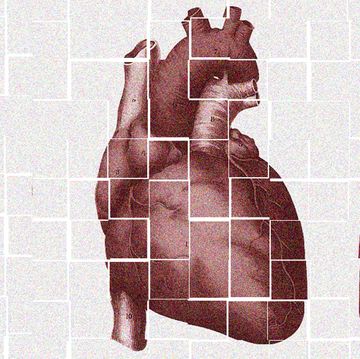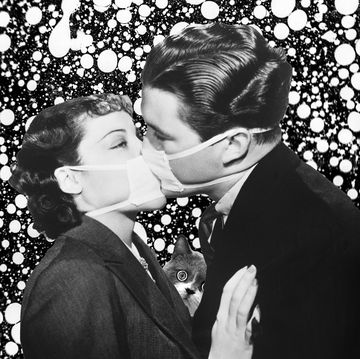The other day I was scrolling through my Twitter feed when I came across a stupid but nonetheless alarming post from my number one source of celebrity penis-related news. "Tommy Lee may be aging," it read, "but he ain't shrinking—in fact, his much younger gf wants you to know he's still living very large."
How very nice for them both, I thought. And then a few minutes later it hit me: Wait. Does the penis shrink when you get older? Everything else we have to worry about in the world, and now this?
Turns out the answer is a little more complicated. The penis can shrink, somewhat, but not to the degree to which you might be worried. In fact, considering the list of things men have to be conscious about when it comes to penile health, a few lost centimetres over time is the least of our concerns, Dr. Ajay Nangia, a professor and vice chair in the Department of Urology at the University of Kansas Medical Center, told me. Nangia talked me off the ledge when it comes to shrinkage, but he laid out a number of other health issues to consider that pertain to how our penises change over time. Here, it's best to hear them from the doctor himself:
Will your penis shrink over time?
It shouldn't change. It doesn't normally. But as we age, our erectile function declines—not always, but based on smoking, diet, hypertension, diabetes. If it is going to occur for medical reasons, it's either vascular (meaning blood flow), or the nerves are not as sensitive. Other things like trauma are rarer. But the four reasons erections happen are: vascular—the blood flow in; the nerves that help blood flow and give sensation; the hormonal pathway (partially testosterone); and finally, the psychological. With time, a man's vascular system potentially gets decreased blood flow, which is why things like Viagra work.
What does less blood do to your penis?
It's like a wet sponge versus a dry sponge. Take two sponges identical in shape, and let one dry a long time. The one that's dry, the little pockets of air inside it shrink up or collapse, and the sponge shrivels up. That happens over time with some men with erectile dysfunction. If you're not having a good cycle of blood flow going in and out throughout the day, then the chambers in the penis (called the corpus cavernosum) don't get the blood flow in. Naturally, that chamber gets smaller, which can give you the perception of being shrunk, or smaller in size. A person who used to be a shower could be more of a grower.
How do testosterone and nerve damage play a role?
Testosterone declines with age, which could have an effect on the psychological, meaning the libido. Nerve damage comes back down to this sponge phenomenon. Men who have nerve damage for one reason or another, such as people that have had their prostate removed or have diabetes [can also see damage to those blood vessels that supply blood flow to the penis]. If the nerves are damaged, the blood flow decreases.
Will your penis get less flexible over time?
The chambers I'm talking about, the spongy ones that fill up with blood, are surrounded by a very firm layer called the tunica albuginea. The collagen in that layer changes over time to become less elastic. Not only do you have a situation where the sponge doesn't grow as much, but then the elastic nature of the penis declines with time. Therefore it's stiffer, if you will—an ironic word to use. It doesn't expand as easily. It's the same whether flaccid or erect, but you'll notice it in the erect state. It's not like it gets tight and you feel it, it just doesn't stretch longer. It's like when you get older and your Achilles tendon doesn't stretch as much, so you have to stretch more.
What if you're overweight or obese?
The penis comes out from under the pubic bone, and it's got a ligament that holds it in place. If you have body fat that now is shrouding over the penis—Dr. Oz aways jokes about 10 pounds for every inch, but I don't know where that number came from—needless to say if you can't see it, you can't perceive it. We call it a buried penis. That happens over time to a large proportion of people, since we have such a high obesity rate in this country. That gives people the perception of shortening. It can also be real shortening, without adequate blood flow [from narrowed arteries] due to obesity.
What can be done to forestall changes in the penis over time?
Arguably if one keeps a healthy lifestyle, if no one gets cholesterol problems or heart disease, vascular disease, hypertension, or diabetes, and you keep cycling blood through the penis well enough, most people won't get erectile dysfunction.
Is erectile dysfunction a harbinger of bad things to come?
The penis is the lightning rod for the rest of the body. If you get erectile dysfunction, you could actually be having a situation where you are predetermining heart disease by 10 years. You've got little blood vessels in the penis, and if you're getting problems with them, you might be getting problems with blood vessels further out in your body, and the worst place for that is your heart or brain. If you're starting to show signs of erectile dysfunction, you better get your lifestyle changed, and make sure you check your blood pressure and that you're not diabetic.
Is sagging balls a myth?
I don't know where the urban legend has come from. That's not necessarily true. Men's scrotums don't become more saggy with age. It's very individual. Men wrinkle, but I don't see men with saggier scrotums.
When is it time to worry about prostate or testicular cancer?
Testicular cancer's high incidence is from the age of 15 to 35. It's the number one cancer of young men—8,800 patients a year, which is not a lot by many standards. It can happen at any age, but you see the peak of it in that period. It's when the tissues are readily growing for sperm production, and they go wrong and form a testicular cancer. Prostate cancer is a disease of older men.
What about young men who don't want to go to the doctor?
The important things to stay away from are risky behaviours—such as unprotected intercourse, or skateboarding and dirt bike riding, which could lead to trauma. Use protection, do self-exams. You don't necessarily need to go to the doctor every year like a 40-year-old, but eat well, exercise, diet, and balance sleep and work stress. Try not to over-do the whole cellphone multitasking thing that social media has created for us. Trauma is the biggest fear, because it can damage the sperm-producing cells, and maybe even testosterone production and fertility. Protect the genitals if playing sports. We always joke when baseball batters get hit by a pitch in the groin. Hopefully they're wearing a cup.













